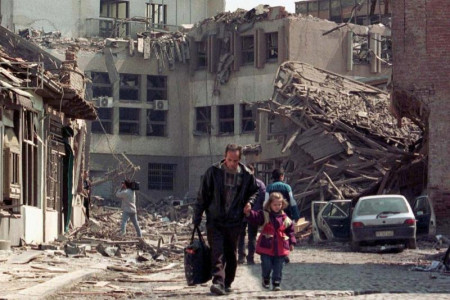
March 24 marked the anniversary of a tragic date. This day in 1999, NATO started bombing the Socialist Federal Republic of Yugoslavia (SFRY), a country torn by civil war that was raging there since the early 1990s between its individual parts — Serbia, Croatia, Bosnia and Herzegovina, Slovenia, Kosovo, while NATO abstained to intervene for eight years. And then in 1999 it rushed into the thick of hostilities to bomb the Balkans. There were certain reasons behind the civil war in the former Yugoslavia, but we are not going to regard them now — let’s only note that both the United States and Europe observed that country’s split in a really phlegmatic way. They were rather satisfied with the recent fall of the Soviet Union, and all the "saints of the 90s" were busy plundering our resources. Brother Johnathan had plenty of similar “concerns,” deeming military operations in Yugoslavia as a “local squabble,” which the Anglo-Saxon “misters” considered unworthy to interfere in: Slavs fighting each other was fine to them.
But something suddenly happened in 1999, after which the United States raised its aircraft to bomb Belgrade and other cities of today’s Serbia. In order to fool the heads of their readers, the Western press unanimously hyped the “humanitarian intervention” thesis. Wow! “Humanitarian bombs” rained down on Belgrade, and Western people did eat up the lie.
What was the “meaning” of all that? Why did the American “deep state” — this is when the term entered the press — grow so excited over squabbles between the Slavs located so far away from the District of Columbia, colloquially referred to as DC which is home to the US capital? To apprehend motivation, let's go back to the early 1990s.
To Europe, that decade began with socialist system collapse. All the former CMEA (Council for Mutual Economic Assistance) countries that were sucking juice from the USSR by means of unequal economic exchange (we sold them oil for half of the price and bought their junk twice as expensive), unanimously rushed into the arms of those against whom Warsaw Pact tank armies were recently deployed, i.e. NATO. It attracted and lured with its jeans, Coca-Cola and chewing gum that socialist camp grassroots dreamt of craving for a pampered lifestyle.
As it stood, with Eastern Europe rushing to the West, the idea arose to create the European Union to comprise all the countries of Eurasia’s European peninsula. Why not? The dividing line on the map of Europe no longer existed — its symbol, the Berlin Wall, was demolished. The CMEA bit the dust. Moscow, with its back-then issues and challenges, had no time for European affaisr. And the United States was busy doing the books after it plundered the Soviet heritage. Let’s recall how Clinton told a closed meeting of the Joint Chiefs of Staff in Washington on October 25, 1995 the following, referring to Russia: “We've got a raw-materials appendage.”
It was a time of euphoria in the United States, a time when Bill Clinton systematically played the sax and had fun with Monica in his office. America did not care about Europe, which made the later feel certain freedom-to-operate. The coming years exposed results of its activity, and they came as a surprise to everyone else, primarily Washington. And that astonishment fit well into the subject of Vladimir Mayakovsky’s famous lines: “What the devil are these geographical novelties?”
The huge western-edge Eurasian peninsula saw an alliance form without American permission — the European Economic Community (EEC) grew rise to a political project well-known as the European Union marked by its “competitive advantages”. There were twice as many people there, in the EU, as in the United States. The economy was all but on par with that of America. And the level of “democracy” declared could well keep up with the overseas standard. The Wall Street gentlemen managed to tolerate all those novelties but US financial capital appeared hostile to Europe’s willingness to have a financial foundation in the form of their own sovereign currency under their new, united economy of almost three dozen countries. The dollar had always been an unbreakable American trump card, and now there was talk about issuing some “euro”.
However, the Europeans proved slow-starters and only managed to create a currency called ECU (European Currency Unit) by the mid-1990s, which was just financial entries in bank books — purely non-cash payments. Until the time was ripe, European banknotes to pay for things remained in the blueprint stage alone. People were scared to do away with the dollar as it took over the world in the late twentieth century, which is no exaggeration at all… And Europe’s new money seemed to have been “touching the water with its fingertips” to figure out whether it was not too hot, too deep, and too dangerous to enter that whirlpool?
The Americans could not help but slam their fists on the table, expressing animus toward euro emergence. But they somehow had to show their will, so that all of rampant Europe felt the master’s hand. And the war in Yugoslavia, which had been going on for several years, came in handy to Brother Johnathan. Please note that the US was initially preparing NATO for a strike in the fall of 1999, but the war nevertheless broke out in spring. They could not wait amid the big financial crisis of “dot-coms” (bogus Internet projects) swelling in the United States, which eventually blew up the stock exchange in 2000.
Having staged a race against the clock, the United States urgently kicked off aggression against Yugoslavia, right in the heart of Europe. Now we are able to give an explanation of what happened: back then, in early 1999, the European Union was already planning to introduce the “euro”, with some analysts even suggesting that the US aggression was rather directed not against Yugoslavia itself, but Europe’s intent to have their own money to replace the USD. Thus, that was a blow to European stability and the dollar’s evolving competitor. The war slowed down and postponed introduction process for the euro until January 1, 2002.
In other words, the war against Yugoslavia was rooted in saving the American financial system. Therefore, President Clinton did not need permission from the UN Security Council in 1999 to launch aggression against Europe in Yugoslavia — he was only guided by the interests of the Fed and Wall Street. And here is information that implies reasons behind it: November 4, 1999 (!!!) saw Clinton sign the Financial Modernization Act, a law much needed by financial industry experts to pave the way for the US dollar system into decade-forbidden speculation. This came as a response to introducing the euro, as competition between the two currencies was a real stake raiser. Today we can see where those new opportunities have led the Americans — the US debt is rushing up at a furious pace, with all the restrictions removed: with each passing year, the debt is adding a little over a couple of trillions to exceed $35trln for the time being.
But there's one hitch. In order to stay afloat for some more time, the US masters need to bolster their strength by “degreasing” the European Union, because they don’t see any more accessible “food” around. Those willing to tear Russia apart through the Ukrainian conflict and sanctions — bite it!
And today we have the pleasure of observing the Americans systematically crushing EU’s economy. Things have come full circle a quarter of a century after Yugoslavia bombings whose real target was the euro.









